If you close your eyes and channel your inner Joanna Gaines, you can picture it: plenty of natural light, a charming but functional desk, cleverly organized office supplies (think mason jars filled with colored pencils, paperclips, and super cute thumbtacks in the shape of animals), a drawer with healthy snacks (dark chocolate anyone?), motivational posters in vintage frames, a chair that’s molded to fit your body, a candle with a woodsy scent, and a storyboard on the wall that brings your novel to life.
Or maybe it’s a den, complete with library (don’t forget the rolling staircase), a crackling fire, a well-stocked liquor cabinet with cut-glass stemware, a soft leather sofa for napping (i.e. concentrating), and a large bloodhound at your slippered feet.
You want it.
But do you need it?
Please note that this post contains affiliate links, which means that if you purchase something you see on our site we may receive a commission at no cost to you. Read our full disclosure here.
Do Writers Need a Home Office?
Well, of course not. It’s not necessary for your career, but it can be an achievable and worthwhile project if you’re someone who needs a space with no distractions when you work.
For example:
- Do you have small children?
- Do you have large children?
- Do you have children?
- Do you have a spouse who also works at home?
- Do you have a mysterious and enigmatic boarder who distracts you with his moody blue eyes?
Then you might find a home office is a necessity, not a flippant desire (not to be confused with a flippin’ desire).
If, however, those things don’t apply to you, there are plenty of ways to make your writing space just as charming, and most of all, just as productive.
WRITER’S HOME OFFICE IDEAS
| The Laptop Bag
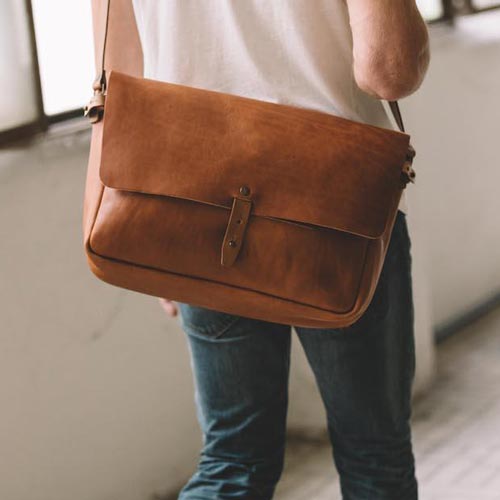
Some writers need a change of view and scenery, so a home office is as simple as a good laptop bag (I’m currently debating selling a kidney for this beauty).
One morning be out on your front porch with a cup of steaming coffee while you outline, the next afternoon take it for a hike up a hillside and write with a view, the following day visit your favorite bakery and scribble over a scone and tea.
Gypsy writing. It’s a thing.
| The Closet
But if that kind of willy-nilly, spontaneous, unplanned shenanigans make you break out in hives just thinking about it, then consider other options in your home. Maybe you don’t have a whole room to dedicate to an office, but think about it: there are very few things you need to create your space.
A closet can make a sweet spot: look for a narrow desk or even a sturdy TV tray. Hang shelving along the back and above for your paper, supplies, and the like. A lamp (if your closet has no light), a folding chair that can be put away later, and your keyboard are all you need.
Just be prepared for a lot of “coming out of the closet” jokes from your family members.
| The Anywhere Rolltop
While the kitchen table isn’t always the best spot for writing your Great American Novel, a dedicated desk system can be a great option.
Scour thrift shops and tag sales for a desk and consider making it your own with paint, new knobs, or refinishing. Old-fashioned, pull-down secretary desks are great for keeping your things organized (which is key) and you can close it up, away from sticky fingers and prying eyes (why are us writers so secretive? Somebody write a book about that, please).
| The Window Seat
Window seats are a novelist’s dream, too. Due to the ever changing view outside, inspiration can strike at a moment’s notice.
If you’re good at balancing your laptop or scribbling your handwritten notes on your lap, a window seat is a great option for you. Just make sure your throw pillow count is precise: too little and you’ll get a backache, too many and you’ll find yourself napping (ahem, concentrating).
| The Drop-Down
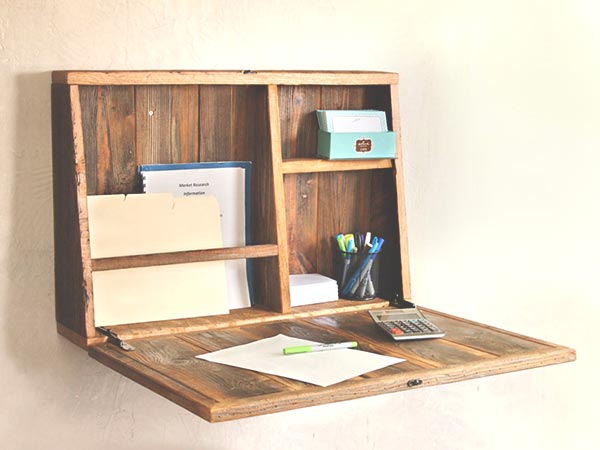
Drop down tables, similar to a Murphy bed, are all over Etsy and other online shopping outlets. Taking up little to no space – especially when closed up – you could fit one of these in a tiny home or a one bedroom apartment.
If all you need is your writing device, a bud vase, and a place to charge your phone, this is your kind of home office.
Minimalists, rejoice.
| The Woodshed
Have a small shed out back you’re not using for anything other than storing your lawn mower? Kick your mower to the garage and reclaim that space.
A fresh coat of paint, a vintage chandelier for ambiance, a smart little desk, and a comfy chair, and you’re set for writing.
I recommend a mini fridge for frequent snacking, and a frosty beverage (maybe your mysterious yet enigmatic boarder with the moody blue eyes will fetch you a refill).
| The Kitchen
If writing makes you hungry, you might want your “office” to be near – if not in – the kitchen. If you have a pantry that goes basically unused, or a breakfast nook that nobody ever uh, nooks in, then you’re good to go.
Some kitchens have built-in homework areas that you can steal from your teen (let’s face it, they’re just checking their phones anyway).
| The Basement
An area in the basement stays cool in the summer, and also has the added benefit of you not being able to hear the doorbell. That’s a huge plus when writing.
No, Great Aunt Sally, just because I work from home does not mean you can drop by unannounced for some gossip and cake. Actually, just leave the cake on the porch.
| The Breakfast Tray
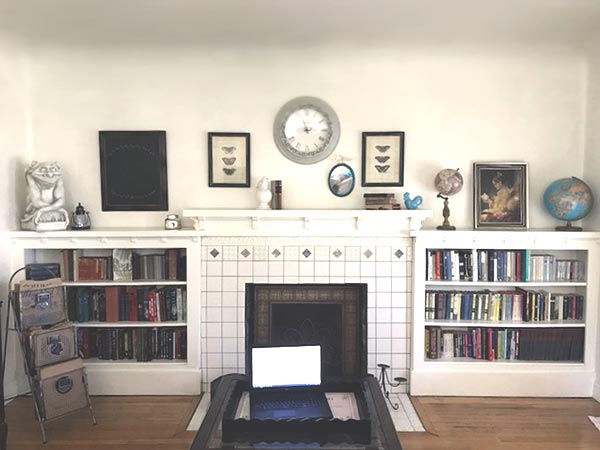
One of those folding breakfast trays is kind of an insta-desk. The perfect size for your laptop and a glass of vino, you can move this baby from room to room, if you’re like me and have to occasionally hide from the small fry.
I actually wrote three books in this manner.
Inspiration from REAL AUTHORS
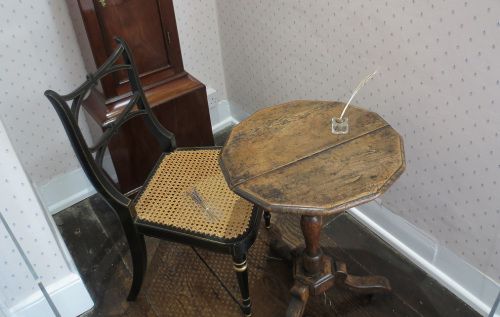
Or get inspiration from real-life writers. You know, those mythical creatures that have somehow made a living from this?
| The Comforter
Mindi Kaling claims she does her best writing in her bed under her covers. Hey! You have a bed! With covers!
| The Gypsy Wagon
Roald Dahl converted an old gypsy wagon into his writing studio. Dagnabbit, why doesn’t craigslist ever get gypsy wagons? It’s like people don’t want me to succeed at life.
| The Tiny Tiny Table
Jane Austen wrote her novels on what appears to be the world’s smallest table. Note to self: restock up on feathered quills.
| The Toolshed
Virginia Woolf wrote in her toolshed. Okay, okay, even she admitted that sometimes it was so cold she couldn’t hold her pencil, but space heaters have come a long way, baby.
| The Gazebo
Neil Gaiman writes his best-selling novels in a converted gazebo. He says there’s a reason he built it just out of reach of his wifi. He may be a genius.
| The Coffee Shop
J.K. Rowling wrote most of Harry Potter in cafes all over England. If she didn’t need a dedicated office space, maybe you don’t either. Just coffee money.
| The Billiard Room
Mark Twain always wrote in his billiard room (evidently these were a thing and not just on the Clue board). A huge fan of billiards, he would spread his notes out over the table to put them in order.
What Will Yours Be?
A covered porch, an uncovered porch, an attic bedroom, a small RV, a corner of the garage, in a boat, with a goat, you can make your writing space just about anywhere. Just add … you and a notebook.
It’s that simple.
PIN IT
Share the love, be inspired, Pin it up.
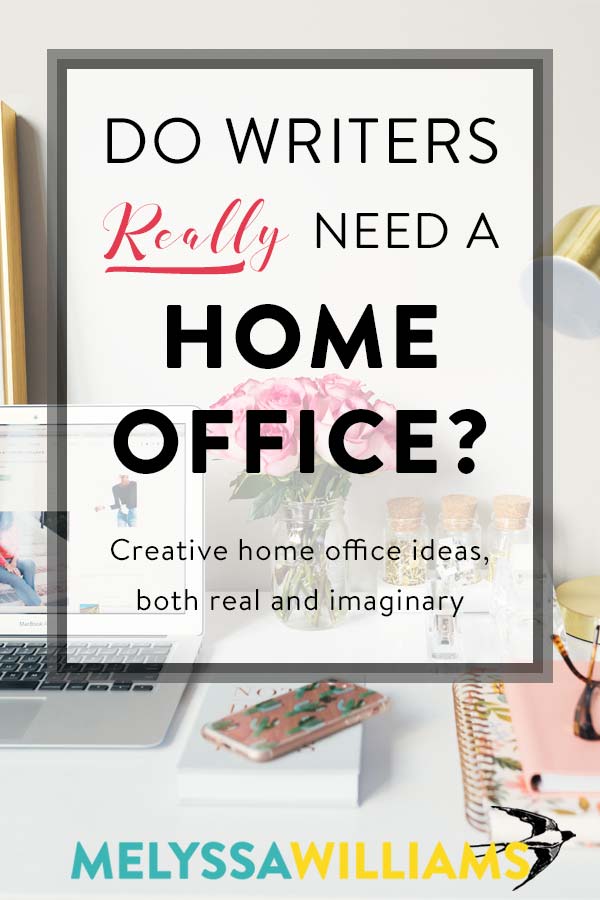

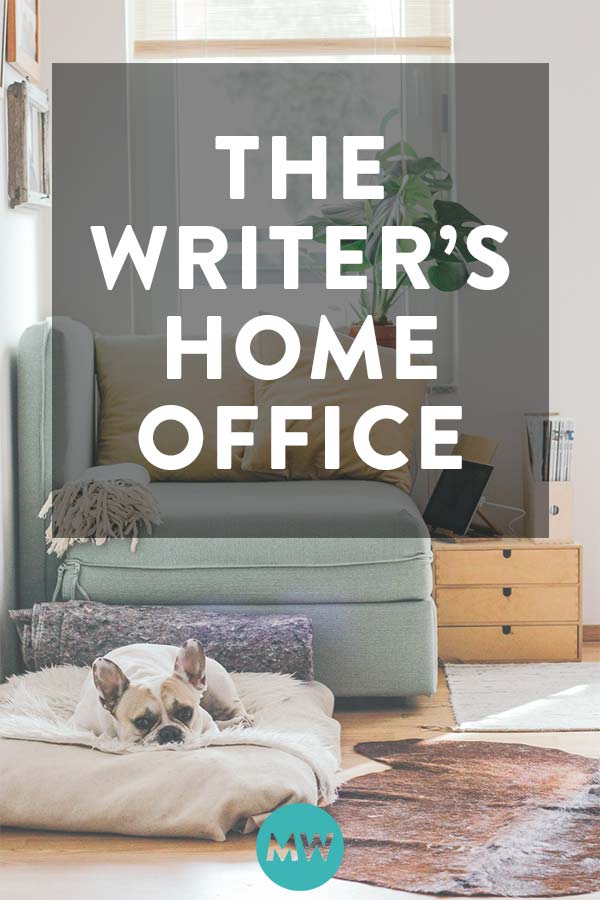
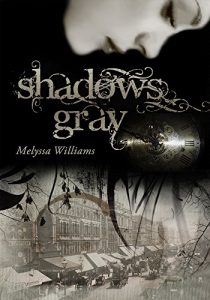


Christin Szczesniak says:
Smooshums, I’m so proud!
I also need a drop down, stat!
July 17, 2018 — 1:03 am
Brittany says:
I love how fun you made this post. Best use of story telling and imagery I have seen in a blog for awhile. I’m moving into a house in about a month and currently planning my dream office. I’m thinking about doing a steam punk theme in the formal dining room since no one uses those anymore.
May 28, 2021 — 3:55 am
melyssa m williams says:
That would be AMAZING! Come back with pictures!
May 30, 2021 — 10:15 pm